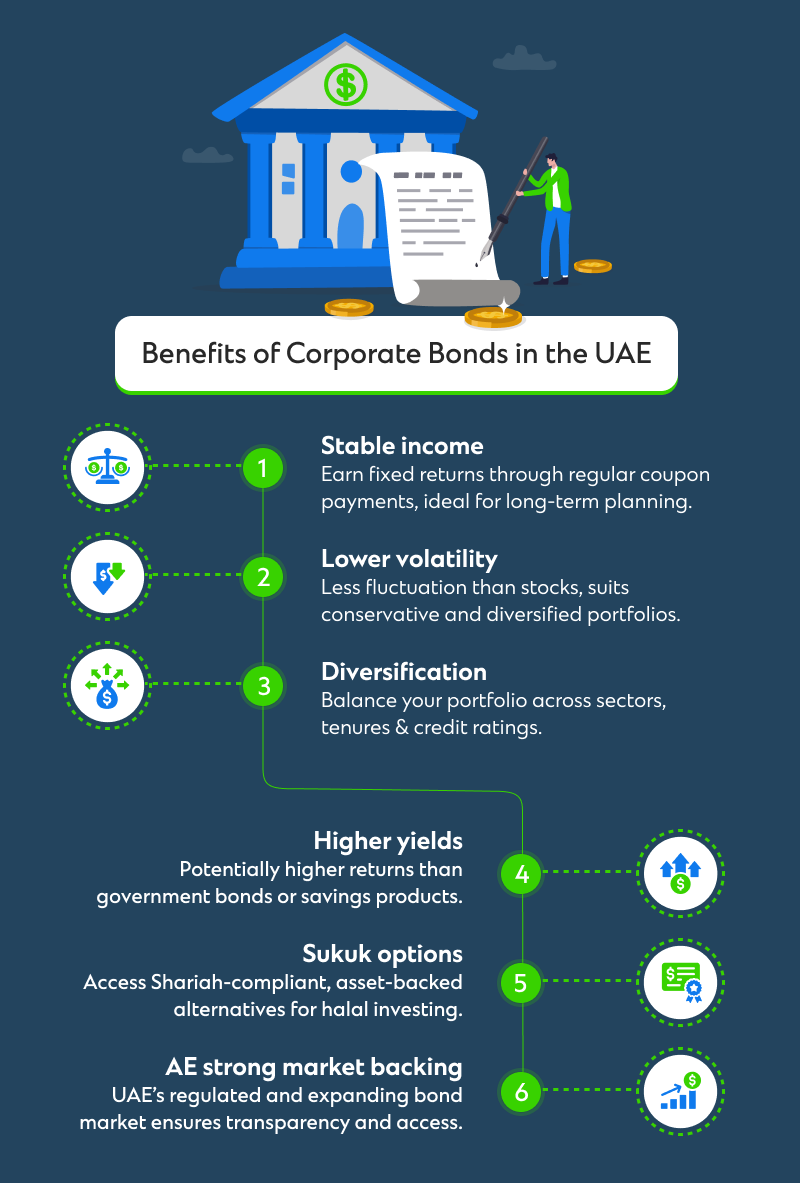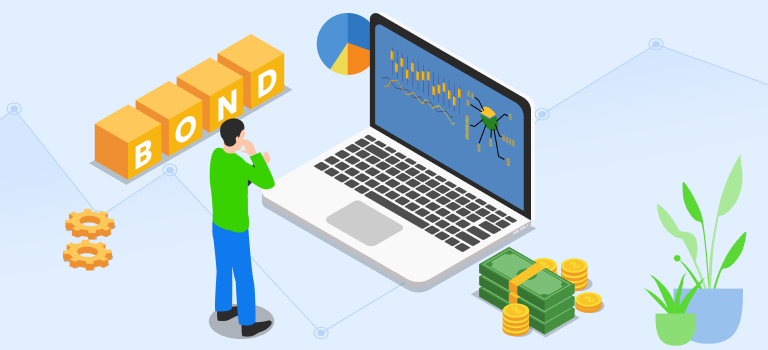
Table of Contents
In a rush? Read this summary:
- Corporate bonds offer predictable income streams and are considered a stable investment option, primarily for investors focused on wealth preservation and succession planning.
- UAE investors have access to various bond types, including government bonds, sukuk, corporate bonds, and national bonds, catering to both conventional and Shariah-compliant preferences.
- Key risks in corporate bond investing include interest rate fluctuations, inflation, early call provisions, market liquidity issues, and changing credit ratings.
With a strong credit standing from major international rating agencies and a thriving economy, corporate bonds issued in the UAE offer local, global and regional investors an opportunity to diversify their investment portfolio.
Investors seeking stability consider bonds an attractive investment option as these fixed-income securities offer a reliable source of income and help balance the risk of more volatile investment instruments, such as stocks.
Why do corporate bonds matter
If you want to diversify your portfolio beyond traditional assets, such as real estate or equity, corporate bonds can be a stable alternative. While stocks make you a part owner of a company, corporate bonds make you a creditor. Stocks grant you potential dividends with higher risks, while corporate bonds give you security.
For investors, the level of protection in an insolvency case can vary. Specifically, if a bond is collateralised, it offers greater security, as it is backed by specific assets. In short, bonds typically offer fixed coupon payments, providing a predictable income stream. This predictability, subject to the issuer’s creditworthiness, is particularly appealing to UAE HNWIs focused on wealth preservation and succession planning.

Understanding bond categories: From corporate bonds to sukuk
The primary categories of debt securities for investors are government bonds (Treasury bonds), corporate bonds, and sukuk, which is a Shariah-compliant bond. Additionally, there are National Bonds, a well-known Shariah-compliant investment product.
- Corporate bonds: Companies issue corporate bonds to raise capital for different purposes. These bonds potentially offer higher yields compared to government bonds, allowing investors to choose from a range of corporate bonds to buy based on maturity and credit rating.
- National bonds: These Shariah-compliant investment products are offered by the National Bonds Corporation. Investors who want to save and invest flexibly with long-term goals can choose national bonds from a variety of plans, including monthly income pay outs and prize-linked savings.
- Government bonds: Government bonds, also known as treasury bonds, are issued by the Federal Government of the UAE. These local currency bonds are a relatively low-risk investment option, reflecting the government’s creditworthiness. They typically offer fixed interest payments and are considered a stable choice for those seeking capital preservation.
- Sukuk: These are Shariah-compliant bonds that are absolutely aligned with the Islamic finance principles. You can consider sukuk as an alternative, ethical, and faith-based investment option.
Risk involved with corporate bond investing
The market value of bonds declines with prospective interest rate hikes. Similarly, heightened inflation also influences the value of the interest payments. Therefore, while investing, investors must be aware of inflation risk.
If a corporate bond has a call provision built in, the issuing company can repay the bond’s original principal before maturity. This means there is no guaranteed interest payment for the full term of the bond, as the payments stop once the bond is called.
The liquidity of the bond market can be an issue. Although investment-grade corporate bonds are usually in high demand, if you want to sell bonds on the secondary market, it will not be easy for you to find ready buyers.
Remember, credit risks can also change over time. Therefore, there is no guarantee that a company will not default on its corporate bonds. Typically, creditors or bondholders are paid first during a company’s bankruptcy, even before the shareholders.
Strategic corporate bond investing: Building a resilient portfolio
Before deciding which corporate bonds to buy, it’s better to build a sound corporate bond allocation strategy that can show resilience through changing market conditions.
- Remember, if you want to grow, manage, and protect your wealth, you need to pay close attention to your investments with proper planning.
- You can also diversify your investment across different sectors, maturities, and currencies to reduce concentration risk and optimise yield potential.
- Include sukuk allocations in your investment to receive asset-backed stability. Along with that, you can also hold core investment-grade bonds for stability and high-yield corporate bonds for enhanced returns.
Corporate bonds: A core for long-term wealth
If you are seeking long-term wealth preservation, corporate bonds can serve as a resilient core in your broader investment strategy. In the face of ongoing global uncertainty, it is essential to stay vigilant by tracking issuer credit ratings, financial health, and macroeconomic trends to mitigate concentration risk and prevent credit events.
Speak to a Standard Chartered relationship manager or contact us to learn more about bond investments in the UAE.



